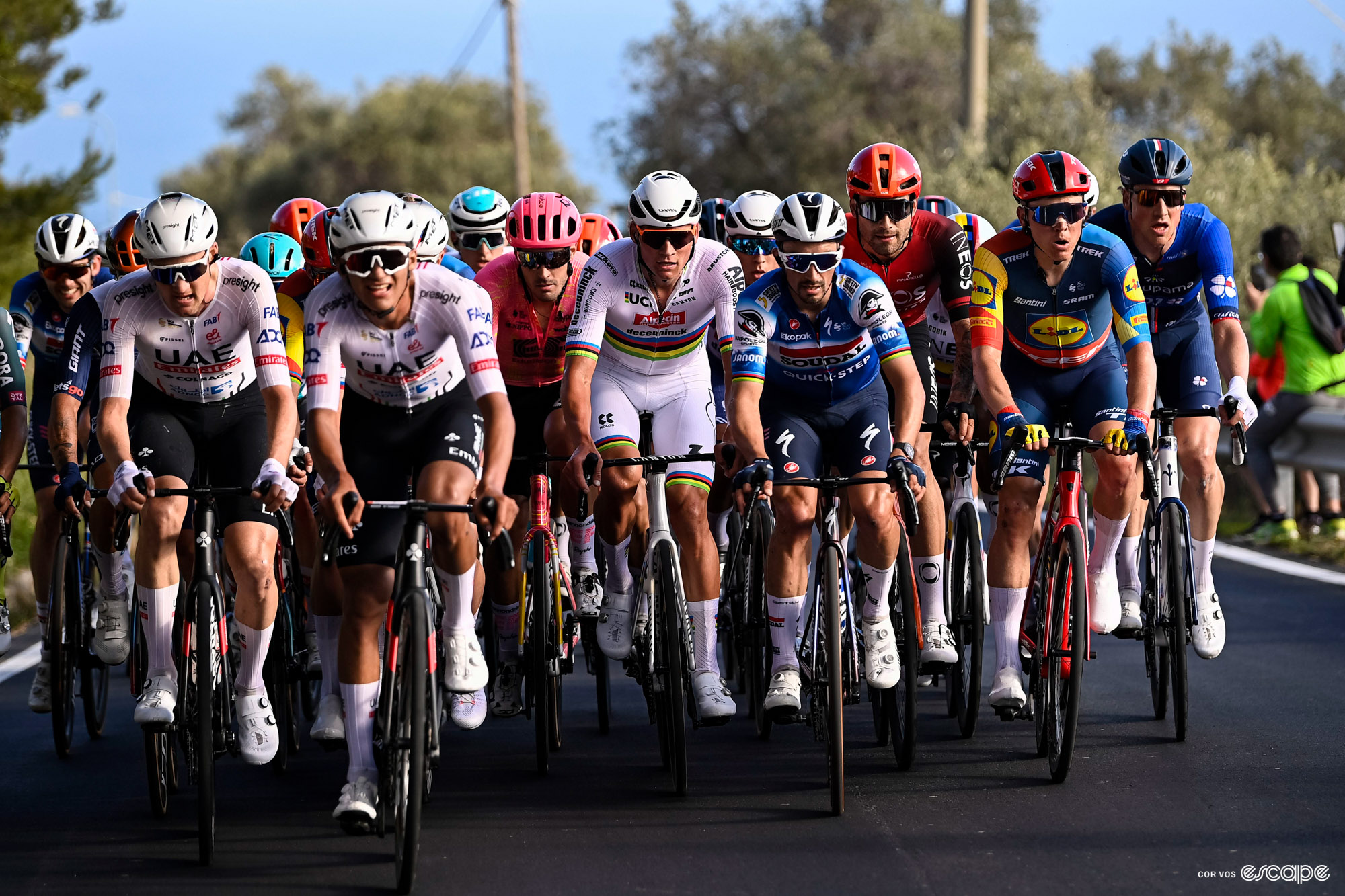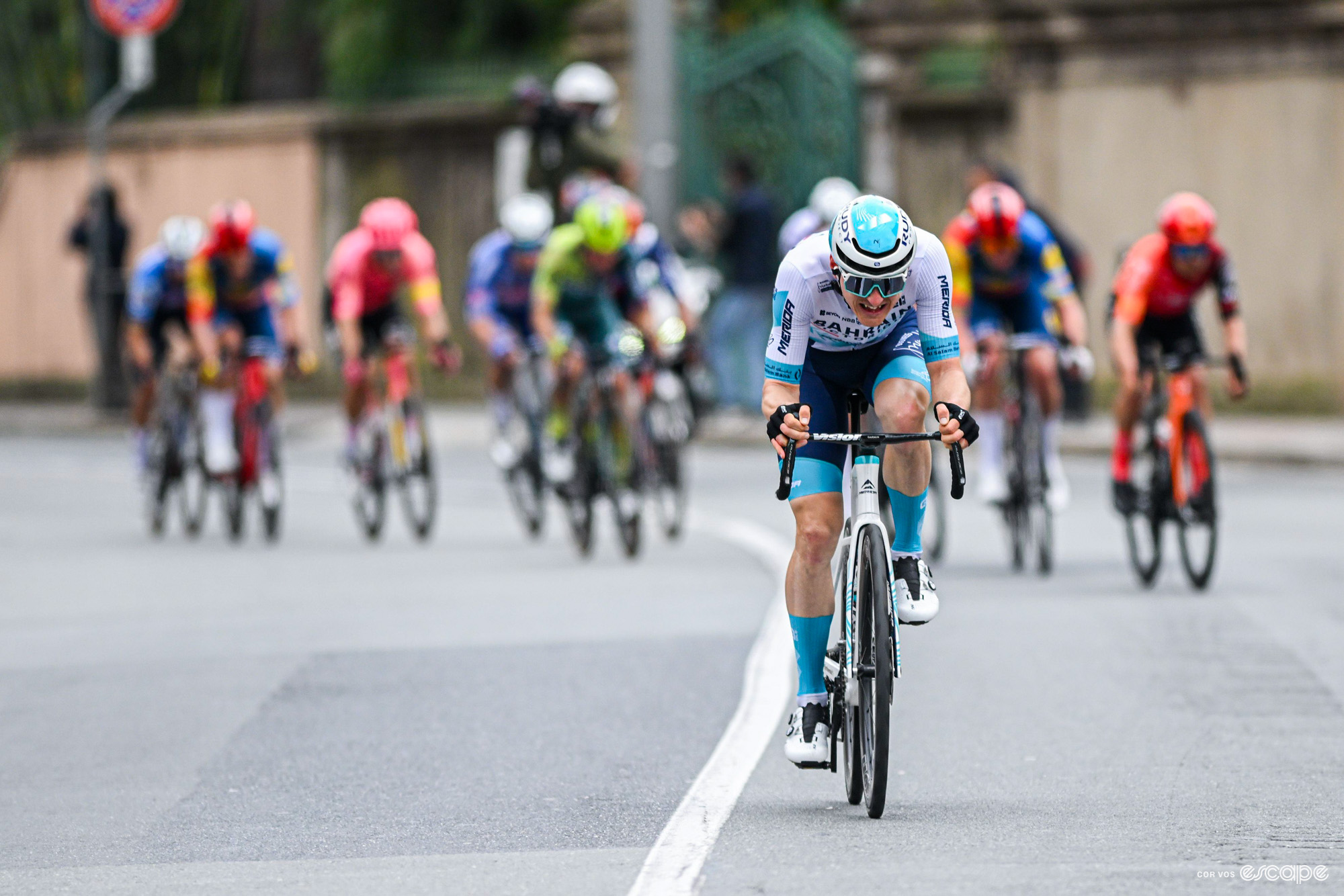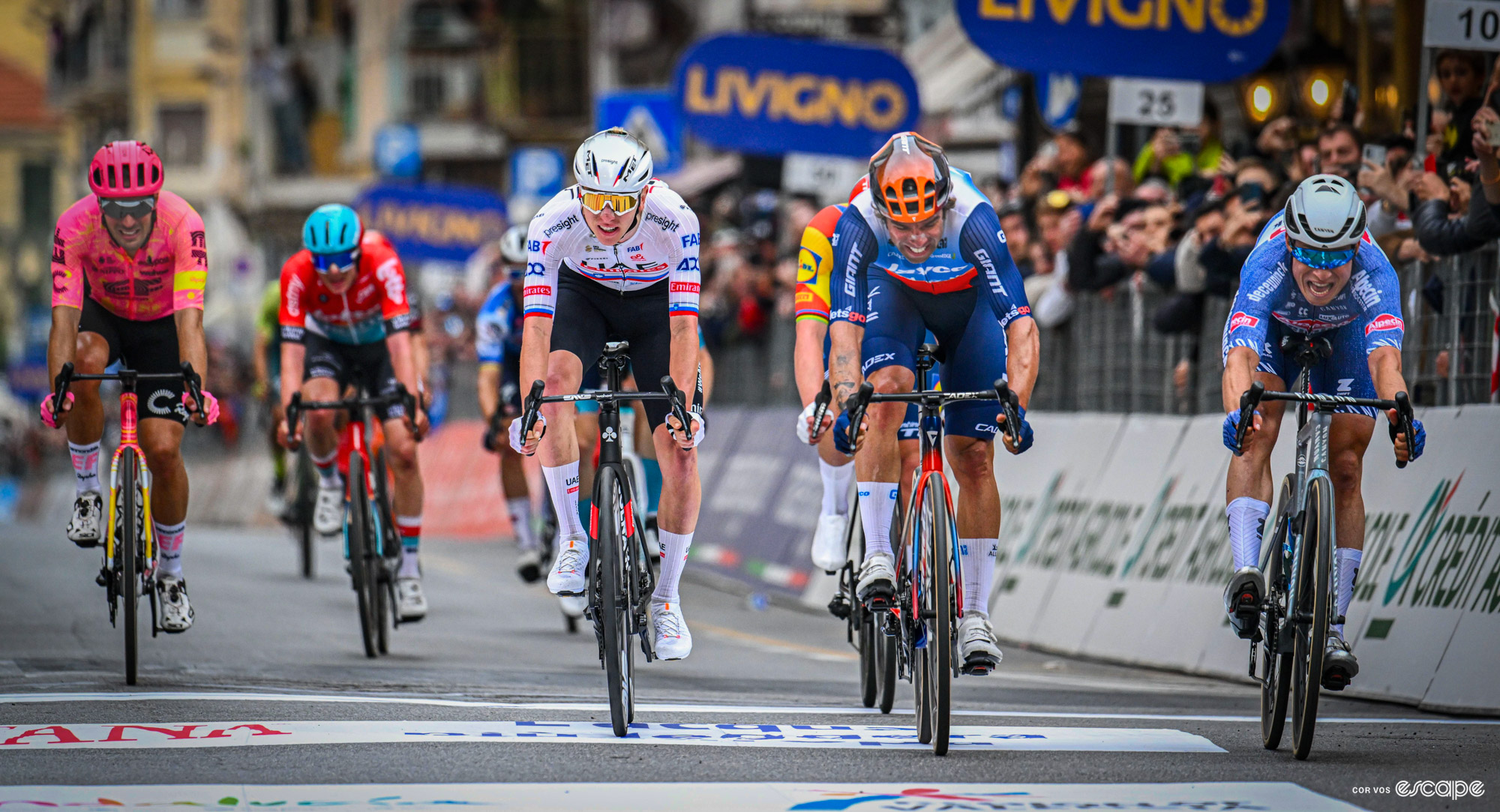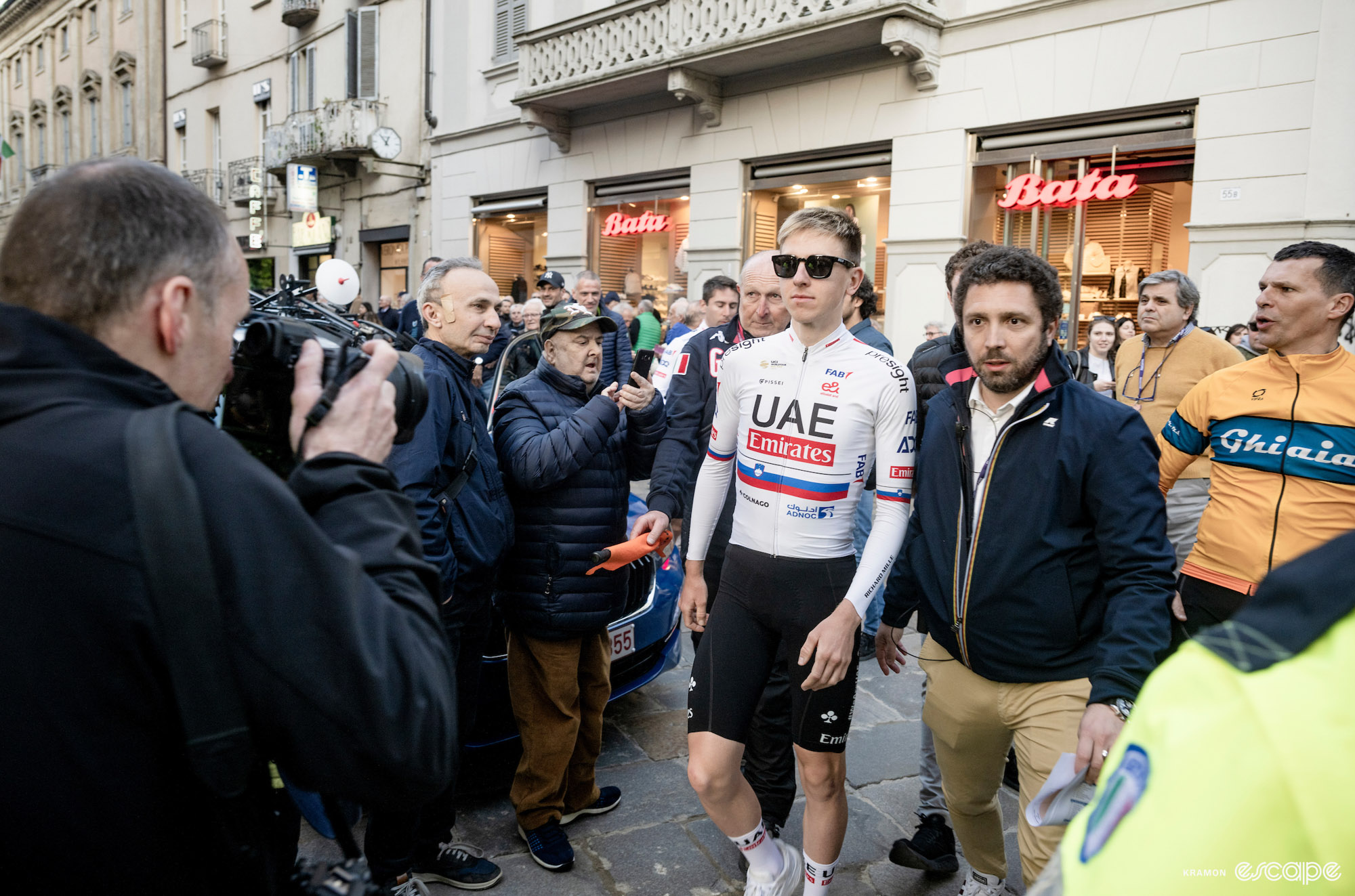There is, in cycling, always something to be said about hubris. The sport, through some kind of enforcement of a powerful spiritual balance, loves and needs its topplings from the sky. This becomes especially true whenever a rider brags to the press. Tadej Pogačar has developed over the years a certain kind of boyish swagger, one backed by a very real threat of winning. He has every right to wear cool guy sunglasses and bleach his hair, and every right to hint at doing the impossible: going long on the Cipressa in Milan-San Remo. In a Slovenian pre-race interview, he basically said (to paraphrase and translate), that UAE Team Emirates was going to show everyone that San Remo is not the hardest monument to win. These were fighting words, and this time, coming off an 80k all-timer at Strade Bianche, Pogačar lost, and by lost, I mean came in third. When Pogačar loses, he never fails to entertain. There wasn’t a critical moment of the race where he wasn’t trying his best to win. Even when it came down to a spectacular final two kilometers, he was there in the mix, a threat one couldn’t count out. But things didn’t happen the way he planned.
Many, including this writer, love to wax poetic about the long, tense anticipation of Milan-San Remo, the five hours of prime Italian tourism footage accompanied by the commentators reminding fans tuning in for the first time this season who transferred where and whether they could possibly play a part in the later antics. Nothing in Milan-San Remo is ever a slow burn by the time the peloton hits the last fifty kilometers, and by that time, a six-man breakaway, from which only Polti-Kometa’s Davide Bais will persevere until the final act, was already starting to wane. All it took was one long pull by UAE Team Emirates for half a minute to get shaved off on the Capo Berta. It is by this time that things can begin to go awry, and they do.
What, exactly, happened on the famed Cipressa? It’s hard to say. I think it’s true that Pogačar saw a possibility in the penultimate climb. Because he said this out loud, or at least hinted at it, the rest of the peloton was on him like white on rice. By the time the climb started, Pogačar was already out of position, physically shoved out during the run-in, requiring his team to spend a bit of extra effort. Allesandro Covi was the first to spend himself for his leader, then, surprisingly, it was Isaac Del Toro. Were I Pogačar, I think I would have found it rather painful to watch my own man burning his candle at both ends with the effort failing to cause a decisive split in the peloton. In the wings were the big guns like Mads Pedersen and Filippo Ganna, certainly not dropped into oblivion. Pogačar was visibly looking for more pace. Almost all of his men were gone. Where was, for example, Hirschi? Or Ulissi? The team had to rely on Tim Wellens to deploy the last stage of their rocket, and it wasn’t enough. The plan to force the peloton to relent, utterly failed.

I’m not sure whether Pogačar could have gone on the Cipressa if the plan was successful, whether these climbs in Milan-San Remo are steep enough for him to make a difference, however, the counterexample is always the unlikely win of Vincenzo Nibali. It certainly is possible, but it wasn’t today. Whether that’s because of a botched strategy, or a botched deployment of a good strategy. But in the winding descent of the Cipressa, Pogačar and his allies were fast running out of road.
Pogačar, Stuyven, Pedersen, and Van der Poel formed a small gaggle on the downhill, aided, in part, by an unfortunate crash on a right-hander behind. By this point, the break is caught, with the exception of the valiant Bais who really gave it his all, to his credit. The chaos that followed from the Cipressa to the Poggio ensured that everyone caught up to everyone else. A certain energy infected the peloton after it became clear that Pogačar’s great plan was foiled and it could once more be anyone’s race. He, really, was no more of a threat than anyone else after his team’s fizzling out. Everyone started taking a turn at the front, FDJ, Tudor, Alberto Bettiol coming off one of the best wins of the season so far in Milano-Torino. If anyone has the right to not be scared of UAE Team Emirates, it’s Bettiol who bested three of their riders.
When the Poggio loomed, the favorites materialized in its shadow. Pogačar, with his MVP Tim Wellens, Van der Poel, Bettiol, Ganna. These men forced a split between themselves and Pedersen, but not for long. Wellens, it must be said, was absolutely killing himself for Pogačar. No matter what one thinks of the tactics, one can’t say UAE Team Emirates didn’t try. With only six kilometers left, Pogačar knew his time was then or not at all. He leapt out of the saddle and pulled about five meters out of thin air, but Van der Poel isn’t a group two syndrome type of guy – at least not when he’s decked out in full white bibs. Lidl-Trek assembled their forces with Jasper Stuyven, Bettiol showed his colors once more. Pogačar was caught. With 5.8 kilometers left, the race opened up into a free for all. Pogačar attacked. He threw his whole body into trying to use that tiny 8% section of Poggio to finish the job but at that point, everyone believed in themselves a little more. I think that was key. In Strade Bianche, Pogačar was able to force a kind of nihilism in the peloton. Yes, his attack was explosive, but at a certain point, no one else in the race had any faith in the possibility of winning. At San Remo, no such eclipse took place. Hope lived, and with it, the race. Indeed, the riders absolutely scrambled for hope. Everyone tried.

The descent of the Poggio is probably the most nerve-wracking two minutes in all of cycling. It’s a nailbiter of a descent, and often more decisive than the climb itself. Watching the likes of Pogačar, Van der Poel, Pidcock, Pedersen and Mohorič trade space in the lines of one another, inch close in the hairpins, lean precipitously towards the ground, all within the crowded landscape of villas, fences, and cars, invites a mesmerizing nausea. (Because my wifi had gone out, I was watching the race at the IKEA cafeteria and let out more than a few loud hisses.) The spiraling figures against the dark asphalt reminds me of moths orbiting a bright light, implicitly knowing they can only orbit, never land. It was perhaps inevitable that Mohorič would take this opportunity to try and pull off what he did in 2022. He materialized seemingly out of nowhere, a flash of white. Yet he, too, ran out of road faster than what remained of the peloton ran out of belief. It wasn’t just Mohorič who gave it a shot. Bora’s Sobrero gave it a real try, an absolute underdog in the race, but he, too, was caught – by Pidcock, who himself looked a bit more certain, and yet, some great force was upon him too and it would go to a very, very abrupt reduced sprint. The attacks had swallowed up any time for a leadout.

In the end, it makes sense that the best sprinter in this group, and arguably, in the world, Jasper Philipsen, would win Milan-San Remo. He appeared, as though the peloton parted for him, and crossed the line, with a surprising Michael Matthews in tow for a late-career highlight. Pogačar, in a testimony to his inability to concede, came in third. Suddenly, and abruptly, the longest race of the year had ended. It was a good edition, one where even an obvious winner wasn’t so obvious. One where no one team dominated, and the team that tried failed to pull off their heist. A friend of mine told me he barely watches cycling anymore because of his dominance fatigue. It’s races like these that serve to remind us that the gods of hubris are always watching. As long as they are, so should we.
What did you think of this story?

